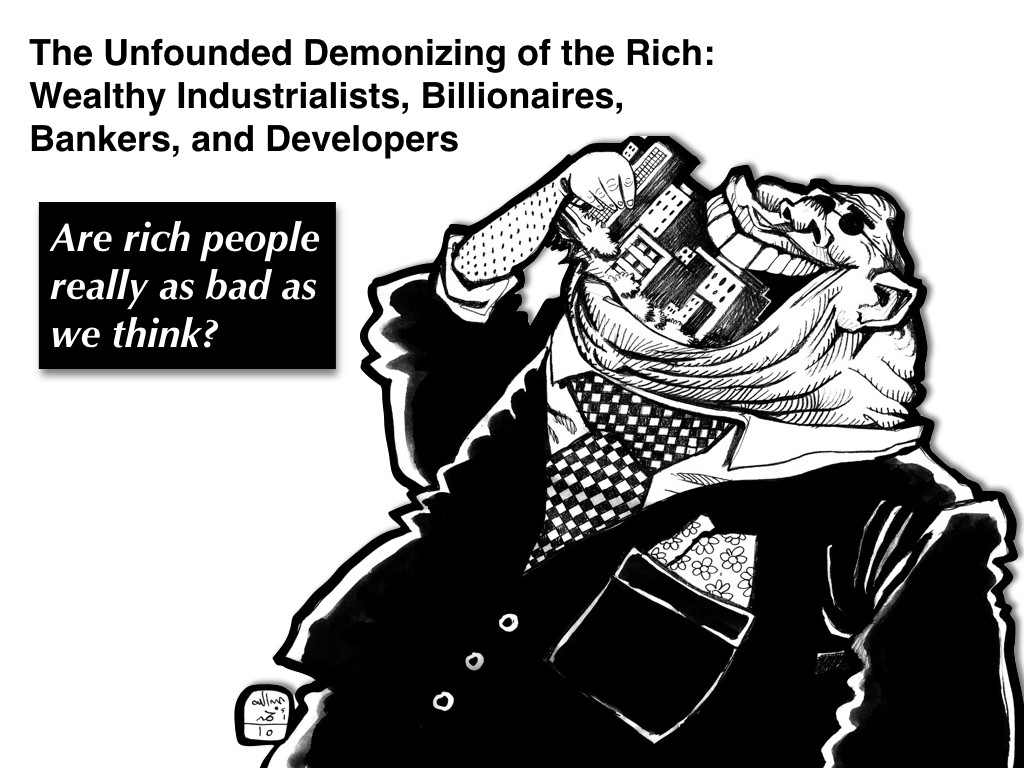A common theme through the ages is the depravity, greed, and selfishness of the wealthy. Their exploitative treatment of the poor and careless destruction of the planet has caused the rich people to become the scapegoat for many of society’s ills, including the climate change that currently threatens all life on earth.
The current presidential election in the United States is offering a fresh reminder of how Wall Street and the Billionaire Class have failed our country and looted the public trust. Bailouts to oil companies, banks, airlines, and the auto industry are examples of unrestrained welfare for the wealthy, while at the same time our politicians are cutting welfare for the working poor. Someone should call the police and report a robbery in progress.
So, are rich people as bad as we’ve come to believe?
It’s important not to immediately assume all wealthy people gained their riches through exploiting the poor or ravaging natural resources.
In 2009, Bill Gates and Warren Buffet founded The Giving Pledge initiative to inspire other wealth people to give their riches to charity. Now, millionaires and billionaires are getting inspired to pledge their wealth toward public interest and charity work.
Recent news has provided some excellent examples of how compassionate wealthy philanthropists are giving back to society. Here are a few examples.
- Egyptian Billionaire Identifies Two Islands for Refugee Haven (Sources: CNN, Bloomberg, Huffington Post, MSNBC, Time.)
- Manoj Bhargava, Billionaire Founder of 5-Hour Energy, plans to give 99% of his wealth to charity (Sources: BillionsInChange.com Wikipedia.)
- Mark Zuckerberg and Priscilla Chan Pledge 99% of Their Facebook Shares ($45 billion) to Charity (Sources: Forbes, New York Times, Reuters, USA Today, Wall Street Journal, Washington Post.)
These are the headline stories of big name billionaires, but they are just examples of what’s going on in communities all over the world — in all of our communities we know of wealthy people who are doing good with their money and influence.
Billions in Change
Manoj Bhargava has launched an initiative called Billions in Change that focuses on practical inventions and solutions to world problems. The video trailer and full documentary (47 minutes) are below.
Trailer (3 minutes)
Full Documentary (47 minutes)
Parable of the Rich Person
Cultural views and opinions about rich people have existed as long as rich people have been around. There’s a teaching from the First Century about this topic — a parable told by Jesus (Luke 18:18-26). The story is often misinterpreted to have an opposite meaning of what was originally intended.
(18) A certain ruler asked him, “Good teacher, what must I do to inherit eternal life?”
(19) “Why do you call me good?” Jesus answered. “No one is good—except God alone. (20) You know the commandments: ‘You shall not commit adultery, you shall not murder, you shall not steal, you shall not give false testimony, honor your father and mother.’”
(21) “All these I have kept since I was a boy,” he said.
(22) When Jesus heard this, he said to him, “You still lack one thing. Sell everything you have and give to the poor, and you will have treasure in heaven. Then come, follow me.”
(23) When he heard this, he became very sad, because he was very wealthy. (24) Jesus looked at him and said, “How hard it is for the rich to enter the kingdom of God! (25) Indeed, it is easier for a camel to go through the eye of a needle than for someone who is rich to enter the kingdom of God.”
(26) Those who heard this asked, “Who then can be saved?”
People tend to focus on the portion of the story about a camel going through the eye of a needle and conclude that rich people will have trouble ‘getting to heaven’ (or becoming enlightened good people).
However, the following verse (26) states: “Who then can be saved?” So the point Jesus was making is not that rich people are bad so they can’t go to heaven. His point was that despite all the good that a rich person can do, it’s still difficult just on that basis to ‘enter heaven.’ It’s that context that invokes the response, “Who then can be saved?”
People have differing beliefs about the nature of heaven. Some conclude that heaven refers to the state of inner peace, tranquility, wellbeing, and a sense of meaning that we experience on earth and perhaps carry with us into some kind of afterlife. Regardless of one’s views about heaven, it’s something that isn’t bought through charitable giving or service projects. It requires inner work to find peace in this life or the afterlife.

